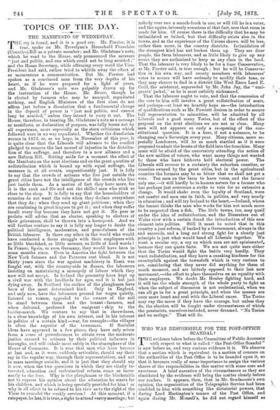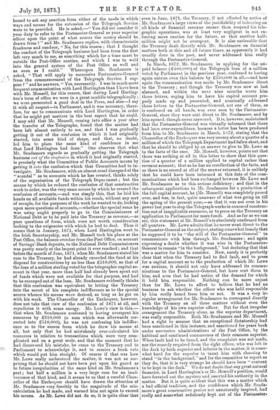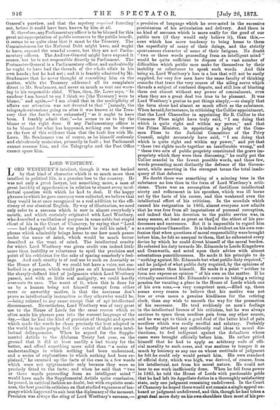WHO WAS RESPONSIBLE FOR THE POST-OFFICE SCANDAL?
THE evidence taken before the Committee of Public Accounts- with respect to what is called "the Post-Office Scandal" is now before us, and very curious evidence it is. We observe that a motion which is equivalent to a motion of censure on the authorities of the Post Office is to be founded upon it, so that it becomes really of some importance to assign the various shares of the responsbilities in this matter with some care and exactness. A brief narrative of the circumstances as they are elucidated by the evidence will bring the matter clearly before our readers. It appears, then, that in Mr. Scudamore's own opinion, the organisation of the Telegraphic Service had been confided to him with something like dictatorial powers, that during Lord Hartington's tenure of the Post Office, and again during Mr. Monsell's, be did not regard himself as
case to the Treasury, he had already exceeded the fund at his clear that when the Treasury had to find fault, and to press disposal for constructions by no less than £518,000, so that of for a capital account as to the production of which Mr. Lowe the loan of a million sterling voted for the telegraphic capital ac- was anxious, it should not only have addressed its comma- count in that year, more than half had already been spent out nications to the Postmaster-General, but have sent them to of funds which were not available for that purpose, and had him, and seen that he had notice of the demand for which to be recouped out of the loan. Mr. Scudamore evidently thinks it held him responsible. Nothing can be more unjust that this confession was equivalent to letting the Treasury than for Mr. Lowe to affect to believe that he had no into the secret of his complete indifference as to the special business to ask whether the officer who was held responsible source whence his means were derived, so long as he got on by him really heard from him or not. It was a very ir- with his work. The Chancellor of the Exchequer, however, regular arrangement for Mr. Scudamore to correspond directly does not take that view of the confession of 1871 at all, and with the Treasury on all these matters without even the repudiates it with some energy. Mr. Lowe's view is this,— knowledge of his own superior officer. But for that irregular that when Mr. Scudamore confessed to having overspent his arrangement the Treasury alone, as the superior department, resources by £610,000 (a sum which was afterwards cor- was really responsible. Both Mr. Scudamore and Mr. Monsell rected into £518,000), he was not confessing his indiffer- had a right to assume that an exceptional dictatorship had ence as to the source from which he drew his means at been sanctioned in this instance, and sanctioned for years back all, but only that he had mistakenly over-calculated his under successive administrations of the Post Office, by the resources in relation to transactions which were very com- habitual and continued concurrence of their common superior. plicated and on a great scale, and that the moment that he When fault had to be found, and the complaint was not made, had discovered his mistake, he came to the Treasury and to nor the remedy required from the right officer, who was left in Parliament to acknowledge it, and to receive a fresh vote the dark by both superior and inferior in the matter, it is some- which would put him straight. Of course if that was how what hard for the superior to taunt him with choosing to Mr. Lowe really understood the matter, it was not so stir- stand "in the background," and for the committee to report as prising that he should not have been put upon his guard as they do, that it is very strange he should have been " content to future irregularities of the same kind on Mr. Scudamore's to be kept in the dark." We do not doubt that any great natural part ; but half a million is a very large sum for an inad- financier, in Lord Hartington's or Mr. Monsell's position, would -z-ertence of that kind, and it seems to us that a careful Chan- have ferreted out the mystery and asserted his authority in the cellor of the Exchequer should have drawn the attention of matter. But it is quite evident that this was a matter which Mr. Scudamore very forcibly to the magnitude of the mis- a bad official tradition, and the confidence which Mr. Scuda- calculation he had made, and warned him not again to exceed more's great constructive genius not unnaturally inspired, had his means. As Mr. Lowe did not do so, it is quite clear that really and somewhat sedulously kept out of the Postmaster- bound to ask any sanction from either of the mode in which even in June, 1871, the Treasury, if not affected by notice of ways and means for the extension of the Telegraph Service Mr. Scudamore's large views of the justifiability of indenting on were to be provided. He is asked,—" You did not consider it all kinds of financial revenue sooner than suspend his tele- your duty to refer to the Postmaster-General as your superior graphic operations, was at least very negligent in not en- officer upon the point of what source the money should be forcing more caution for the future, so that another half- drawn from ? " and Mr. Scudamore replies, with characteristic million might not be overspent. It is also noticeable that frankness and candour, " No, for this reason ; that I thought the Treasury dealt directly with Mr. Scudamore on financial the conduct of the Telegraph business had been from the first matters both at this and all future times, as apparently it had left very much to me, as something which for a time must be usually done in the past, and never addressed him really outside the Post-Office routine, and which I was to weld through the Postmaster-General.
into the general system of the Post Office as well and In March, 1872, Mr. Scudamore, in applying for the un- as soon as I could." Whereupon Mr. Scudamore is paid balance (£400,000) of the Telegraph loan of a million asked, " That will apply to successive Postmasters-General voted by Parliament in the previous year, confessed to having from the commencement of the Telegraph Service, I sup- again outrun even this balance by £350,000 in all,—and here pose ? " and he answers, " Yes, necessarily. I was in much more again the communication was made by Mr. Scudamore direct frequent communication with Lord Hartington than I have been to the Treasury ; and though the Treasury was now at last with Mr. Monsell, for this reason, that during Lord Harting- alarmed, and within the next nine months wrote him ton's term of office we were in a great muddle telegraphically ; three letters, urging him to have his capital account pro- we were persecuted a good deal in the Press, and also—I say perly made up and presented, and nominally addressed it with all respect—in Parliament, and it was necessary, there- these letters to the Postmaster-General, not one of them, as fore, for me to communicate with Lord Hartington, in order is confessed on all hands, was ever seen by the Postmaster- that he might put matters in the best aspect that he could. General, since they were sent direct to Mr. Scudamore, and by I may add that Mr. Monsell, coming into office a year after him opened, though never answered. It is, however, maintained the transfer of the Telegraphs, found that the matter had that the Postmaster-General was virtually informed that there been left almost entirely to me, and that I was gradually had been over-expenditure, because a letter has been produced getting it out of the confusion in which it had originally from him to Mr. Scudamore in March, 1872, stating that the started, into some kind of shape, and that, no doubt, Chancellor of the Exchequer was very uneasy about a quarter of a led him to place the same kind of confidence in me million of which the Telegraph Department had fallen short, and that Lord Hartington had done." One observes that what that he should be obliged by an answer to give to Mr. Lowe as Mr. Scudamore regards as gradually getting the Telegraph to the facts of the case. Mr. Mon sell, however, points out that business out of the confusion in which it had originally started, there was nothing at all in this letter to show that this ques- is precisely what the Committee of Public Accounts means by tion of a quarter of a million applied to capital rather than getting it into the confusion which that Committee had to in- revenue account; that as he has no recollection of the facts, and vestigate. Mr. Scudamore, with an almost cruel disregard of the as there is no record at all of the answer returned, it is unlikely " scandal " as to accounts which he has created, thinks solely that he could have been informed at this date of the com- of the organisation of the Telegraph Department ; but the munications which had been exchanged between Mr. Lowe and means by which he reduced the confusion of that constructive Mr. Scudamore as to this serious deficiency ; and that in the work to order, was the very same means by which he created the subsequent applications to Mr. Scudamore for a production of confusion of accounts,—and was simply this, that he laid his the full capital account, he (Mr. Monsell) was completely passed hands on all available funds within his reach, without any sort over, and was, in fact, quite unaware of what was going on till of scruple, for the purposes of the work he wanted to do, looking the spring of the present year,—so that it was not even in his upon mere questions of accounts,—whether the special sums he power last year to stop the Telegraph works in course of construe- was using ought properly to go to the Commissioners of tion out of inapplicable resources, or to press on the Treasury an National Debt or to be paid into the Treasury as revenue,—as application to Parliament for more funds. And as far as we can pure questions of form, which were not worth consideration see, this statement of Mr. Monsell's is absolutely confirmed from looking to the exigencies with which he had to deal. Thus it all quarters. Mr. Lowe admits that he never went direct to the seems that in January, 1871, when Lord Hartington went to Postmaster-General on the subject, stating somewhat lamely that the Irish Secretaryship, and Mr. Monsell took his place at the he supposed it to be " the will of the Postmaster-General" to Post Office, the balance overdue from the Post Office, on account communicate with him through Mr. Scudamore ; and again of Savings'-Bank deposits, to the National Debt Commissioners expressing a doubt whether it was wise in the Postmaster- was pretty nearly at the largest point it ever reached ; and that General to remain "in the background," but declaring that that before the month of June, 1871, when Mr. Scudamore stated his was a matter for him to consider. Now, surely it is perfectly
General's purview, and that the mystery required ferreting out, before it could have been known by him at all.
If, therefore, any Parliamentary officer is to be blamed for this great misappropriation of public resources to the public benefit, it seems to us quite clear that it must be the Treasury. The Commissioners for the National Debt might have, and ought to have, exposed the scandal sooner, but they are not Parlia- mentary officers. The Auditor-General might have exposed it sooner, but he is not responsible directly to Parliament. The Postmaster-General is a Parliamentary officer, and undoubtedly he ought to have had the threads of the whole affair in his own hands ; but he had not ; and it is frankly admitted by Mr. Scudamore that he never thought of consulting him on the matter, while the Treasury addressed all its complaints direct to Mr. Scudamore, and never so much as sent one warn- ing to his responsible chief. When, then, Mr. Lowe says, "In candour I am bound to say I think we [the Treasury] were to blame," and again,—'.I am afraid that in the multiplicity of affairs our attention was not devoted to that " [namely, the telegraph-extensions going on after it was known at the Trea- sury that the funds were exhausted] " as it ought to have been. I frankly admit that,"—he seems to us to lay the blame at the right door. If any Parliamentary officer is to be blamed for what has happened, nothing can be clearer on the face of this evidence than that the fault lies with Mr. Lowe. Mr. Scudamore was of course, as he himself zealously and chivalrously maintains, primarily in fault ; but Parliament cannot censure him, and the Telegraphs and the Post Office cannot spare him.




































 Previous page
Previous page